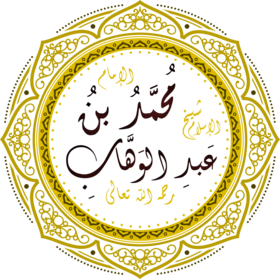मुहम्मद इब्न अब्दुल वहाब
मुहम्मद इब्न अब्दुल वहाब (अरबी: محمد بن عبد الوهاب) पूरा नाम अबूल-हुसैन मुहम्मद इब्न अब्दुल वहाब अल-तमीमी (1703 - 22 जून 1792), एक धार्मिक नेता,इस्लामी विद्वान और धर्मशास्त्री थे।[1] आम तौर पर स्वीकार किया जाता है कि अब्दुल-वहाब का जन्म 1703 में मध्य अरब के क्षेत्र नजद के एक गाँव 'उयेयना' में हुआ था। ऐसा माना जाता है कि मुहम्मद इब्न अब्दुल वहाब ने वहाबी आंदोलन को संस्थापित किया।[2][3][4][5] न्यायविदों के परिवार में जन्मे इब्न अब्दुल-वहाब की प्रारंभिक शिक्षा, इस्लामी कानून के हंबली सिद्धांत के अनुसार हुई, जो उनके जन्म के समय, क्षेत्र में सबसे अधिक प्रचलित सिद्धांत था।

इन्हें भी देखें
संपादित करेंसन्दर्भ
संपादित करें- ↑ Haykel 2013, पृ॰प॰ 231-232.
- ↑ "Analysis Wahhabism". PBS Frontline. मूल से 2018-12-26 को पुरालेखित. अभिगमन तिथि 13 May 2014.
For more than two centuries, Wahhabism has been Saudi Arabia's dominant creed. It is an austere form of Sunni Islam that insists on a literal interpretation of the Quran. Wahhabis believe that all those who don't practice their form of Islam are heathens and enemies. Critics say that Wahhabism's rigidity has led it to misinterpret and distort Islam, pointing to extremists such as Osama bin Laden and the Taliban. Wahhabism's explosive growth began in the 1970s when Saudi charities started funding Wahhabi schools (madrassas) and mosques from Islamabad to Culver City, California.
- ↑ "Sunni Islam". globalsecurity.org. मूल से 2018-12-26 को पुरालेखित. अभिगमन तिथि 18 August 2014.
- ↑ "Wahhabi". GlobalSecurity.org. 2005-04-27. मूल से 2005-05-07 को पुरालेखित. अभिगमन तिथि 2008-05-10.
- ↑ although some Sunnis dispute whether Wahhabism is Sunni (source: http://www.sunnah.org Archived 2020-02-22 at the वेबैक मशीन, Wahhabism: Understanding the Roots and Role Models of Islamic Extremism, by Zubair Qamar, condensed and edited by ASFA staff)